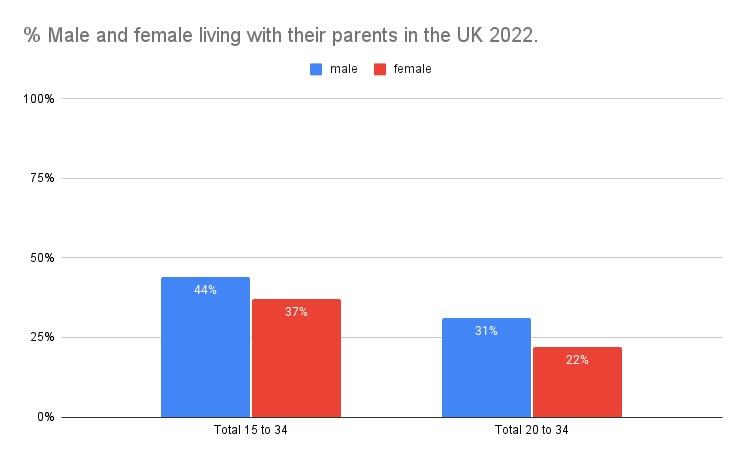Last Updated on September 14, 2023 by Karl Thompson
Having an overview of statistics on family life in the UK is a useful starting point for studying families and households.
Nine important stats to know about families and households in the UK in 2022:
- There are 19.4 million families.
- There are 28.2 million households.
- 57% of families are classic nuclear family households with either dependent or adult children living in the same house.
- 30% of households are single person households.
- 31% of men who live alone are 65 or over as are 48% of women.
- 31% of adult males live with parents compared to only 22% of adult females, aged 20-34.
- The marriage rate has halved between 1991 and 2019.
- The average age of marriage was 35.4 and 33.2 for men and women respectively in 2020.
- Single parent families are twice as likely to be in poverty than two parent families.
The rest of this post explores these statistics in more depth. Sources are towards the bottom of the post!
Family types in the UK in 2022
There was a total of 19.4 million families in the UK in 2022, an increase of 1 million since 2012.

- There were 12.8 million married couple families in the UK in 2022, representing 66% of all families.
- There were 3.7 milion opposite-sex cohabiting families, 19% of all families.
- There were 2.9 million lone parent families, 15% of all families.
- There were 110, 000 same-sex cohabiting couple families and 110, 000 civil partner couple families (both types around 0.6% of all families).
- The number of married coupe families and lone parent families have decreased slightly since 2012.
- Cohabiting and civil-partner families have increased slightly since 2012.
NB: the statistics above only show family households, they don’t include single person households, which make up about 30% of all households in the UK today.
The nuclear family is still the main type of family
- 11.1 Million households had children living in them, so this means 57% of families are classic nuclear families.
- 8.2 million of these families had dependent children in them and 2.9 million had only non-dependent children.
- 8.3 million families had no children living within them.
So for all the talk of the decline in the nuclear family, the statistics suggest the nuclear family is still the predominant family type.
Households types in the UK in 2022
There were 28.2 million households in the UK in 2022. This means the average household size is 2.36 people per household.

- One family households are the main households type. There were 18.8 million one family households, 67% of the total.
- There were 8.3 million single person households in the UK in 2022, 30% of the total.
- Houses of unrelated adults (house shares) were 3% of the total.
- Multi-family households made up 1% of the total.
Living Alone: younger men and older women!
Men aged 45-64 are most likely to live alone. Of men who live alone, 34% are aged 45-64.
Of women who live alone, 37% of them are aged 75 or over!
| Age group | % of those living alone men | % of those living alone women |
| 16-24 | 3% | 2% |
| 25-44 | 24% | 11% |
| 45-64 | 34% | 27% |
| 65-74 | 19% | 24% |
| 75+ | 16% | 37% |
Graphics on living alone from the ONS…


The number of adults living with their parents has increased.
The number of adults living with their parents rose by over 14% between 2011 and 2021 to 4.9 million adults.
Young adult males are more likely to live with their parents than young adult females.
In 2022 31% of males aged 20-34 lived with their parents compared to only 22% of females aged 20 to 34. (Source).

The marriage rate almost halved between 1991 and 2019
In 1991 there were just under 40 marriages per 1000 unmarried men. By 2019 this had halved to just under 20 per thousand. The trend is similar for women but not quite as dramatic.
The marriage rate then plunged to around 6/1000 during covid, but it will probably bounce back in coming years!

The average age of marriage has increased since
The average (median) age of men marrying in 2020 was 35.4 years and for women this was 33.2 years.

Marriage ages were around 26 for men and 24 for women in the early 20th century, then declined to 22 for men and 21 for women between 1940 and 1970.
From 1970 the average age of first marriage has increased to the mid 30s for both men and women, but it now seems to be levelling out!
Single parent families are twice as likely to be in poverty

Almost 50% of lone parent families are in relative poverty, double the rate of two parent families, according to the IFS. (NB: Pre-pandemic figures!)
Sources
Families and Households 2022 (Office for National Statistics).
Nine Facts about Marriage (Office for National Statistics).
ONS More Adults Living with their Parents.
ONS Marriages in England and Wales.
To return to the homepage – revisesociology.com

One thought on “Families in the UK – Nine Interesting Statistics”